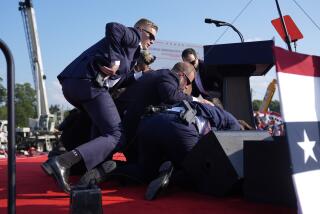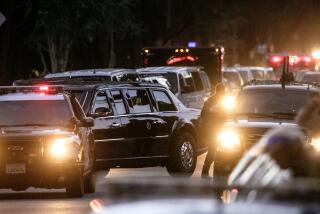White House Streets to Be Shut
- Share via
WASHINGTON — Security around the White House will become a notch tighter today as the four blocks surrounding the presidential grounds will be made off-limits to parked cars and meandering passersby.
But members of the business community and the city government expressed irritation, saying that they were not consulted and that the closures will unnecessarily disrupt commerce.
John Gill, a spokesman for the Secret Service, which guards the president, said the move was a “coordinated decision” by his agency, the White House and the District of Columbia. What is being penned as a “no parking, no stopping, no standing” policy on the four blocks closest to the White House is not in response to any threat, he said.
In addition, eight blocks of the downtown area along 17th Street between H Street and Constitution Avenue will be closed to trucks, Gill added. The security measures will help protect the White House from trucks that might be packed with explosive materials, similar to the one that exploded in the World Trade Center garage in 1993.
But the mayor’s office was perturbed.
“We have not received any paper on this proposal. We’re surprised and somewhat disturbed by all this,” said Tony Bullock, a spokesman for Mayor Anthony A. Williams. “We’ve got truckers who’ve been using the same streets for 10 years--and now all of the sudden they have to change their route by 6 a.m. tomorrow?”
In an October report, the National Capital Planning Commission recommended the reopening of E Street, which was closed after the Sept. 11 attacks and which is one of the four streets adjacent to the White House that will remain closed. “In the future, street closures should not be relied upon as a primary security measure,” the commission noted.
Experts worried that the additional security measures might further hamper traffic flow in an already congested city.
“We understand the need to implement security measures. However, we believe there are alternative long-term solutions to keeping the streets safe yet accessible to the public,” said Richard Friedman, chairman of the National Capital Planning Commission task force.
Barbara B. Lang, president and chief executive officer of the District of Columbia Chamber of Commerce, said her organization had not been notified either. “Security procedures should be planned in collaboration with local government as well as business leaders to ensure an enjoyable experience for visitors to our nation’s capital and a livable city for our residents,” she said. “We must find ways to keep our city safe and economically secure without suffocating business operations, snarling traffic or frustrating commuters.”
The commission recommended that the stretch of Pennsylvania Avenue between 15th and 17th streets remain closed to autos. That stretch of Pennsylvania, just in front of the White House, was barricaded in 1995 after the bombing of the Oklahoma City federal building.
The White House, through a spokesman, declined to comment on the increased security measures.
More to Read
Sign up for Essential California
The most important California stories and recommendations in your inbox every morning.
You may occasionally receive promotional content from the Los Angeles Times.










